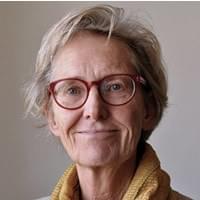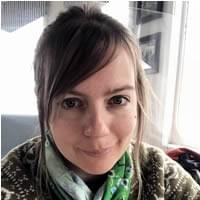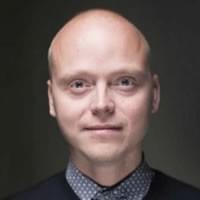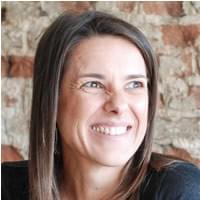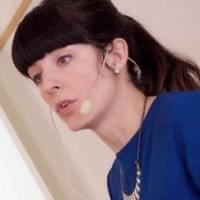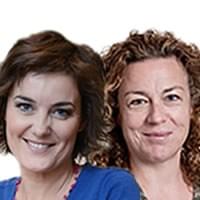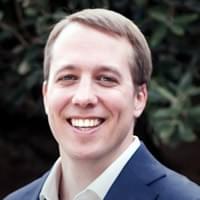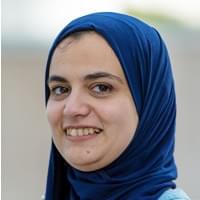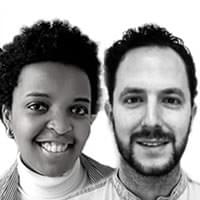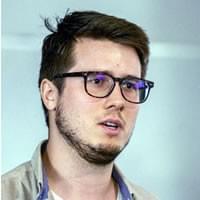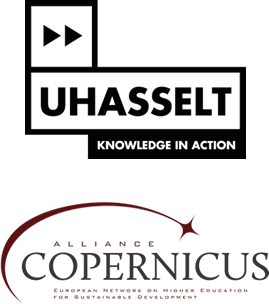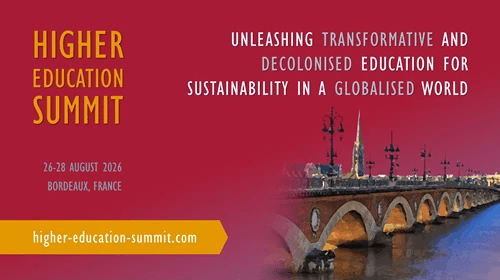
WORKSHOPS

WORKSHOP 1
Building transformative higher education together
We will learn about transition processes, and where - in the process - frontrunners, pioneers and early followers in higher education are already active. We will together analyze which changes are required at the three levels of influence - micro, meso and macro - and how they influence each other; We will check how government and international organizations can support the change, following the concept of the 4 E's: engage, encourage, enable, exemplify.
Jelleke de Nooy van Tol
Jelleke (pronounced Yeleka) studied landscape architecture and planning at Wageningen University; ever since, she initiates, facilitates and directs processes of change and transition toward a sustainable society. She builds on a rich international experience in participative development and experiential learning in spatial development, and knowledge exchange in the transition to agroecology. She is presently involved in including the transition movement in the Netherlands (duurzamedoorbraak.nu) in the Wellbeing Economy Alliance; she is also an active member in Legacy17, a cooperative association for transformative learning.

WORKSHOP 2
Intersecting the circular economy with social aspects uilding transformative higher education together
Circular economy is a contested political concept with many different definitions and imaginations. Some imaginations of circular economy hold a social component, but this social sustainability aspect is not present in every business model, product or infrastructure design or strategy that is called circular. After a short introduction we will reflect on the different imaginations of a social (and) circular economy. After a quick training on how to write social fiction, the participants will be invited to creative writing (social fiction) on their own for twenty minutes. The purpose is not to identify the next Nobel Prize winner or Frank Herbert, but to cultivate our own imagination of a future-proof social circular economy. In the end, participants are invited to share their social fiction ideas and give comments on each other’s ideas.
Wendy Wuyts
Wendy is a researcher, guide and a published writer of English and Dutch stories. She graduated with a PhD in environmental science at Nagoya University, Japan, and is working now in the field of circular economy in Norway. Her first book, which is co-funded by Circular Flanders, “Als Meubels Konden Spreken” (“If furniture could talk”) introduces social and circular economy ideas and principles. Before she lived in Japan, she worked as student assistant in a Yunus Center in Thailand and led or was involved in various international student organizations, events and initiatives.

WORKSHOP 3
Conscious consumption
Increasingly people are waking up to the idea that they want to live more sustainably. What that is though and how to get started, is still a conundrum to many. In this workshop we unpack sustainability and give participants an actionable framework to get started. You leave the workshop with a clarity what a sustainable life means to you and which actions you can take to move forward.
Bruno Delepierre
Throughout his career, Bruno has always been at the intersection of value driven innovation, entrepreneurship and policy. He is the founder of Happonomy, a Leuven based organization working on sustainable transformation, implementing an integrated agenda of individual, organisational and societal transformation. Bruno builds on extensive scientific research mixed with a unique set of life experiences, ranging from a UN diplomatic internship and building a company from scratch, up to being the most senior Belgian TEDx conference organizer to date. Apart from leading Happonomy he is also Managing Director of the Belgian chapter of the Global Entrepreneurship Network, jury member of the European Innovation Council, MIT talent scout and member of the EU chapter of the Club of Rome.

WORKSHOP 4
Community service learning
In Community Service Learning (CSL), the student leaves the classroom to take on a community engagement in a real life setting. The learning then comes by means of a critical reflection on this experience. In what way is CSL a form of transformative learning and what prerequisites are needed for real transformation to take place in a CSL course? In this workshop we will explore the transformative potential of CSL by discussing real cases.
Kathia Reynders
Kathia Reynders studied business administration and went on to teaching economics in secondary as well as higher education. She also organized workshops for secondary teachers in the field of economics at Hasselt University. For several years, she took on a community engagement and mentored young adults in the reflective process within this engagement. From KU Leuven, she facilitates the process of institutionalization of service-learning in higher education (UNISERVITATE).

WORKSHOP 5
Can we move towards a circular society by teaching students design thinking?
Design sits prominently at the heart of the circular economy. It requires us to redesign everything: products, business models, cities and the linear systems that have lasted for the past centuries. According to the Ellen MacArthur Foundation a circular economy is based on three principles: eliminate waste and pollution, circulate materials and products and regenerate nature. All these principles are driven by design.
In this workshop we will share our experiences about organizing online and offline bootcamps with students using design thinking methods and we will discuss the challenges and the outcomes of these bootcamps organized in November 2020 and October 2021. We will also reflect on the experiences of the students and present scenarios how this could be integrated in the curriculum.
Designing out waste and pollution is only a small part of the systemic change that is needed. In the workshop participants will discuss on further developments and opportunities to develop students’ transformative learning. This workshop is based on the bootcamp which is part of the Interreg Euregio Maas-Rijn project Wanderful.stream bringing together eight partners from Belgium, Germany and The Netherlands led by University of Applied Science UCLL in Diepenbeek.
Sara Gilissen
Sara is project coordinator of Wanderful.stream. Other project partners are Wallonie Design (Luik), Z33 (Hasselt) and Discovery Museum (Kerkrade). She works at the University of Applied Science UCLL in Diepenbeek, Belgium.

WORKSHOP 6
Active8-Planet
The Active8-Planet Matrix workshop will introduce you to the Erasmus+ Active8-Planet project and the Active8 Matrix, a tool developed within the project. This tool consists of a canvas to aid teams of students, companies and researchers to develop people- and planet-centred concepts and interventions that are aligned with the Doughnut economics concept. The Doughnut is used as overarching concept for the core guiding agendas of the Active8 Planet project – i.e. the UN Sustainable Development Goals, the European Green Deal and Ethics in Research & Development. The Active8 Matrix is based upon the methodology of the City Portrait Canvas, as operationalization of the Doughnut economics concept.
During a project development, a team should run this workshop three times: at the start to guide and inspire the challenge exploration; at mid-term to check the scope and intention of the service/product concept, as it is developed so far; and at the end to evaluate the final service or product. This workshop is a hands-on introduction to the tool.
Evy Puelinckx and Griet Verbeeck
Griet holds a MSc and PhD in Architectural Engineering from KU Leuven. For many yearsshe was a research fellow at the Building Physics Division of KU Leuven, with in between, a short stay at the Energy Administration of the Brussels Capital Region, where she was co-responsible for the energy policy in the Brussels Capital Region. Since 2007, she leads the Sustainability Research and Education Team at the Faculty of Architecture & Art at Hasselt University. While the focus of her research was at first mostly technological and on the aspect of energy and comfort, she considered this focus to be too limited and that other additional perspectives are necessary. So over the years, she evolved into an educator and a researcher, who is strongly interested in guiding people, students and professionals in the building sector towards more sustainable choices, especially with regard to the use of natural resources, but with attention to social justice and planetary boundaries. She is inspired by the principles of Doughnut economics and sufficiency and tries to introduce them both in her professional and personal life.
Since more than 18 years, architect Evy focuses her work around the concept of upcycling and circular economy. She uses sustainable techniques, unused objects and materials are seen as a source for new creations. Since 2008, she has also founded the community "HetVindingrijk", an online platform to inform and inspire people. In her book, in workshops and through media, Evy has introduced the concept of circular economy to a wider audience. She guides businesses in discovering new opportunities within this system and proactively aims to propagate its potentials through her keynote speeches and academic work. Recently, Evy joined the research team of Hasselt University in the Active8-Planet project, developing a methodology for sustainability education.

WORKSHOP 7
Intertwining higher education institutions in local economies
Universities and schools are often large organisations with an important role in the local economy: they are important employers and spend a lot of money on contractors and subcontractors. On the other hand, they are often funded through national governments or student fees from all over the country and the world. This puts them in the special position of being a large net spender in the local economy. In this workshop we look at what educational institutions can do themselves to lead us toward a more sustainable economy, and how they can overcome hurdles on the way.
Gerben Nap
Gerben obtained a MSc in Ecological Economics from the University of Edinburgh. Since 2015, he works for the Social Trade Organisation (STRO), which develops innovative methodologies to strengthen local economies. STRO developed award-winning payment software (www.cyclos.org) to support its work, with over ten million end users globally. Gerben works as a senior consultant to provide advice on how to strengthen the local economy, and has an active technical management role in several of the projects currently run by STRO in the Netherlands.

WORKSHOP 8
Social economy
How can social innovation change the world (for the better)? An interactive workshop introducing you to social innovation and social entrepreneurship, and how they create empowering opportunities for local and global communities. A glance at some key experiences and learnings in Morocco and beyond.
Maha Ech-Chefaa
Maha is passionate about community work and has been involved in many initiatives since 2003. Currently leading Enactus operations in Morocco, she is particularly interested in how technology and entrepreneurship can bring positive social change.
As former President of “Junior Chamber International (JCI) of Rabat”, she participated in various initiatives and projects in Morocco, co-Founding “Moroccan CISE” in 2012, and Managing Google Business Group (GBG) Rabat where she co-organized the local 2013 +Social Good Summit, coordinated gDayX Morocco 2014, DevFest Rabat and being currently an ambassador of Google WomenTechMakers and Womenwill communities. She is also an Alumna of TechWomen, Ashoka ChangemakerXchange and Enpact programs. Maha was also a finalist at the 2019 Booking.com Technology Playmaker Award in the category “Community Impact”.
In 2014, Maha founded a social venture “Leeha” aiming to empower disadvantaged women in Morocco by providing them business opportunities, using their various talents. Currently, Leeha is producing ergonomic and affordable baby carriers in partnership with the organizsation “Happy Baby”.

WORKSHOP 9
Decolonization
Decolonization is not a metaphor; it is a multifaceted process. But what does decolonizing the university entail? This workshop will critically assess the structures of the university and its effect on its students. This, by giving a definition of decolonization within the academic context and discussing the creation and working of the project WeDecolonizeVUB.
Furthermore, one element of decolonizing an institution is actively pursuing anti-racism. However, often we remain passive anti-racists in the background, and it remains unclear if we actually truly understand the mechanisms of racism and our own responsibility in perpetuating its ideology. This session aims to answer above questions, by analysing common misunderstandings, critically look at our prejudices and outlining possible way forward.
Latifah Abdou and Sebastian Van Hoeck
Latifah is a founding member of WeDecoloniseVUB (Belgium), a student initiative of UCOS (University Centre for Development Cooperation) that provides students tools to learn about (de)colonization and anti-racism in order to actively dismantle Western-dominated world views. WeDecolonizeVUB also aims at creating safe(r) places for racialized students, by creating spaces that tackles sensitive topics and makes room for students to meet. They founded a library that provides books of non-Western and racialized authors, and they further organize events and mobilize for racial justice at VUB and beyond. All these activities and initiatives are carried out by a diverse group of students that form the beating heart and the board of the project. Latifah regularly exchanges and mobilizes with similar student initiatives striving for racial justice in other Flemish universities. Latifah obtained a Master in European and International Governance at Vrije Universiteit Brussel and currently studies African Studies at Ghent University.
Sebastian is an intercultural trainer at the University Centre for Development Cooperation (UCOS) affiliated with the University of Brussels, where for the past five years he has focused on the topic ethical North-South partnerships, global citizenship, and workshops on anti-racism. Sebastian holds an advanced master in Globalization and Development. He has lived various years abroad, having worked with the development cooperation sector in South Africa, Nicaragua & Tanzania.

WORKSHOP 10
Rethinking economics teaching to build new courses
Economy Studies is a practical guide for (re-)designing economics courses and programs. The book offers a road map for effectively connecting core academic material to real world events and the great questions of our time, helping professors to engage students and prepare them for the world of today. It emerged from the worldwide movement to modernise economics education, spurred on by the global financial crisis of 2008, the climate crisis, and the COVID-19 pandemic. This workshop is for anyone who is involved in economics education, whether it is as an academic economist, high school economics teacher or student. During the workshop, participants will become familiar with the core ideas and tools of Economy Studies. Furthermore, they will learn in an interactive way how to apply this to their own courses and how they can help change the way economics is taught.
Sam de Muijnck
Sam is chief economist at the Dutch independent think tank Our New Economy. Together with Joris Tieleman, he published a book on how to reform economics education named ‘Economy Studies: A Guide to Rethinking Economics Education’ (www.economystudies.com). Earlier Sam was the chair of the Future Generations Think Tank as well as the chair of the Dutch branch of the international student movement Rethinking Economics, where he also made a website about economics education to inform the debate (www.economicseducation.org). He followed his undergraduate economics and honours program (cum laude) at the Radboud University in Nijmegen, interdisciplinary research master (cum laude) at the University of Amsterdam, and his internship with the economic advisors of the Ministry of Finance of the Netherlands. Besides his economics activities, Sam is a breakdance teacher (www.damnfresh.com) and hip-hop artist (www.samenfalko.nl).

WORKSHOP 11
Envisioning economic futures
We take a broad look at the role money plays in society. From the point of view of futurists, we engage the imagination by asking ourselves and each other: What would ‘good money’ look like? How might HE better contribute to building a positive economic future?
Designed as an interactive preliminary exercise to formulate topics for HES 2022. Please have your mobile phone to hand!
Marilyn Mehlmann and Miriam Sannum
Marilyn is Vice President of the Union of International Associations as well as a founder member of Legacy17, an international not-for-profit cooperative of leading-edge consultants, practitioners and educators focused on supporting the realization of the UN’s 17 Sustainable Development Goals. She combines psychosynthesis, empowerment and action research to co-create new methods and tools for community, personal and professional development. Speaker, consultant, educator, and author and co-author of numerous publications.
Miriam is an ecologist and pedagogue who has worked with collaborative and transformative processes for 30 years. She has worked with authorities and NGO:s, both as municipal ecologist and as consultant, has facilitated many futures-oriented processes with mixed groups, and has taught at the Swedish West University. Presently she works partly for a nationwide study organization for non-formal adult learning. She also works internationally as well as locally as consultant with transcontextual learning in complex living systems. She is a member of the international Legacy17 cooperative association.
ORGANIZERS & CONTACT
The HIGHER EDUCATION SUMMIT 2021 was organized by Hasselt University and the COPERNICUS Alliance.
If you have any questions, please contact:
office@copernicus-alliance.org
